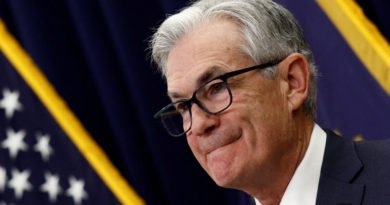Fed’s Harker Blames ‘Scourge’ of High Inflation on Too Much Government Spending and Easy Money Policies
Distressed Patriotic Flag Unisex T-Shirt - Celebrate Comfort and Country $11.29 USD Get it here>>

Excessive spending by the government and accommodative policies of the Federal Reserve have triggered rampant inflation in the United States that is hurting poorer Americans more, according to Patrick T. Harker, president of the Federal Reserve Bank of Philadelphia.
The COVID-19 pandemic threw the United States into one of the “sharpest recessions” in history. However, this downturn was followed by a period of “extraordinary economic growth” that established the foundation for rampant inflation. “Large doses of fiscal spending from the federal government and accommodative monetary policy from the Federal Reserve stoked demand,” Harker said in a speech on Jan. 12.
“This led to a phenomenon known colloquially as ‘too much money chasing too few goods’ and the highest inflation in four decades. High inflation is a scourge, leading to economic inefficiencies and hurting Americans of limited means disproportionately. I find it particularly disturbing that life’s true essentials like groceries, fuel, and shelter have skyrocketed in price.”
Harker said that the Federal Reserve is “absolutely committed” to bringing down inflation back to the 2 percent level. This is being done by adjusting monetary policy, which last year included raising the federal funds rate from about zero percent to range of 4.25–4.5 percent.
The Philadelphia Fed chief is expecting the Fed to raise interest rates “a few more times” in 2023. However, rate hikes to the tune of 75 basis points as occurred last year is something Harker doesn’t see happening. He believes hike of 25 basis points would be appropriate moving forward.
Fed Goal, Sector Performance
The Fed’s current goal is to slow down the economy “modestly” and bring demand “more in line with supply,” Harker said.
Even though the Fed is raising rates and seeing some signs of inflation cooling down, the national economy remains “relatively healthy overall,” which Harker finds “encouraging.” Many Americans continue to spend even if it means dipping into their savings, he pointed out.
Sectors that suffered the most during the COVID-19 pandemic, such as leisure and hospitality, are seeing a “healthy recovery,” while those which built up healthy order books like manufacturing are cooling down, he noted.
“I do remain concerned about commercial real estate, as the embrace of remote and hybrid work is clearly dampening demand for office space in central business districts and suburban office parks,” Harker said.
The Philadelphia Fed chief sees core inflation to come in at around 3.5 percent in 2023, which is above the central bank’s 2 percent target. Core inflation is projected to fall to 2.5 percent in 2023, and then to 2 percent in 2025. Harker expects U.S. real GDP growth to be 1 percent in 2023 and 2 percent in the two subsequent years.
Inflation, Recession
Annual inflation remained above 7 percent for every single month in 2022, except for December, when it slipped to 6.5 percent.
According to a recent survey by the National Federation of Independent Business (NFIB), inflation was cited as the single most important problem by 32 percent of small-business owners.
JPMorgan Chase’s 2023 annual Business Leaders Outlook survey found that 45 percent of small businesses cited inflation as a top challenge in the year ahead, with 61 percent expecting a recession in 2023.
ITR Economics, an economic forecaster, is expecting the economy to slow down this year due to the fact that the 10-year Treasury yield sank below the two-year yield in July. Such inversion signals tend to happen 12–18 months prior to a recession.
During an interview with The Epoch Times, Patrick Luce, an economist with ITR, blamed the weak outlook on the Fed’s aggressive push to raise interest rates.
“We’re still calling for more of a slowing growth cycle in 2023, but the original soft landing that we were calling around the end of 2023 now looks like it’s turning into a hard landing in 2024,” Luce said.
Petr Svab contributed to the report.





